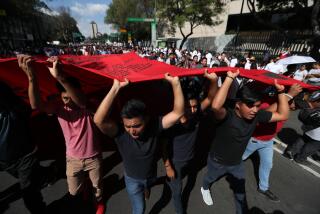Apartheid Abuses: De Klerk Pleads Ignorance
CAPE TOWN, South Africa — In the four months since this nation’s Truth and Reconciliation Commission began investigating the apartheid era, hundreds of victims and survivors have described in agonizing detail how successive white, racist governments used murder, torture and other atrocities to oppress the black majority and keep a tight grip on power.
Many pleaded, often in tears, simply for an explanation as to who had ordered such gruesome abuses, and why.
On Wednesday, the white former president, Frederik W. de Klerk, appeared before the commission to provide some answers.
The bottom line: He didn’t do it, and he doesn’t know who did.
Testifying and answering questions for almost three hours, the National Party leader vehemently denied that he or other senior leaders during his tenure in government, from 1982 to 1994, had ever ordered or condoned “gross violations of human rights.”
De Klerk said government and party policy “within my knowledge and experience . . . never included the authorization of assassination, murder, torture, rape, assault or the like.”
He added: “Nor did I individually directly or indirectly ever suggest, order or authorize any such action.”
In a 30-page submission to the commission, De Klerk conceded that the strict racial laws of apartheid, backed by police-state tactics in what the government then viewed as a war for survival against Communists and black revolutionaries, had “created an atmosphere conducive to abuses and transgressions.”
He said “extensive steps” were taken to prevent such abuses, but he did not reveal what those were.
Although De Klerk’s testimony was his most extensive to date about the rise and fall of apartheid, he provided few new details.
He repeated earlier apologies for the pain and suffering caused by apartheid and accepted “overall responsibility” for government actions while he was president, from 1989 until the first all-race elections in 1994.
But in a surprising defense of apartheid, De Klerk claimed that blacks had “benefited enormously” from the white regime’s race-based policies.
He said the system based on white supremacy had increased black enrollment in schools, built hospitals and houses and led to greater wealth for many people.
De Klerk said he and other young National Party stalwarts initially believed that the policy of “separate development,” the benign term used for often-brutal attempts to force millions of blacks into ethnic “homelands,” would be beneficial to blacks.
“It would be a mistake to think that there was not a strong element of idealism in this vision,” he said.
But he admitted that the policy instead “led to hardship, suffering and humiliation--to institutionalized discrimination on the basis of race and ethnicity.”
Almost 19,000 people were killed in political violence between September 1984 and December 1993.
In his submission, De Klerk repeatedly tried to parcel out the blame, accusing the African National Congress and other militant groups of killing hundreds of people in terrorist bombings, burnings and other attacks.
But at a news conference later, he refused to estimate how many people the apartheid governments had killed or to specify any human rights abuses for which his party or its supporters were responsible.
He insisted, instead, that he had moved to stop or to investigate covert death squads and other illegal government operations as soon as he learned of them.
“We never covered up,” he said.
De Klerk’s appearance marked a new phase for the commission, in which the major political parties are to explain their version of history and their role in the political violence.
Four smaller parties appeared earlier this week. Representatives of the governing African National Congress, headed by President Nelson Mandela, will testify today.
Former leaders of the apartheid-era police force and the military have also agreed to testify, but no dates have been scheduled.
As for Wednesday’s session, Thabo Mbeki, the executive deputy president in Mandela’s ANC government, denounced the testimony, saying afterward that “my overall impression is that De Klerk treated the commission with contempt.”
De Klerk began the political reforms in 1990 that ultimately led to the end of apartheid.
He shared the 1993 Nobel Peace Prize with Mandela and served as Mandela’s deputy president until June, when he resigned and pulled his party out of the government to create a formal opposition in Parliament.
The 17-member commission, headed by retired Anglican Archbishop Desmond Tutu, was mandated by the new constitution to document the horrors of the past in hopes of promoting national reconciliation under democracy.
Besides providing a public catharsis, the commission is empowered to offer compensation to victims of political crimes and to offer amnesty to those who fully confess their role in apartheid-era atrocities. About 500 people have testified so far.
More to Read
Sign up for Essential California
The most important California stories and recommendations in your inbox every morning.
You may occasionally receive promotional content from the Los Angeles Times.











